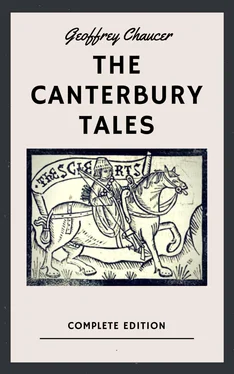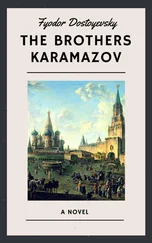Therewith he wept, that pity was to hear.
And, for the people shoulde see him all,
When it was day he brought them to the hall,
That roareth of the crying and the soun'.
Then came this woful Theban, Palamon,
With sluttery beard, and ruggy ashy hairs,<85>
In clothes black, y-dropped all with tears,
And (passing over weeping Emily)
The ruefullest of all the company.
And *inasmuch as* the service should be *in order that*
The more noble and rich in its degree,
Duke Theseus let forth three steedes bring,
That trapped were in steel all glittering.
And covered with the arms of Dan Arcite.
Upon these steedes, that were great and white,
There satte folk, of whom one bare his shield,
Another his spear in his handes held;
The thirde bare with him his bow Turkeis*, *Turkish.
Of brent* gold was the case** and the harness: *burnished **quiver
And ride forth *a pace* with sorrowful cheer** *at a foot pace*
Toward the grove, as ye shall after hear. **expression
The noblest of the Greekes that there were
Upon their shoulders carried the bier,
With slacke pace, and eyen red and wet,
Throughout the city, by the master* street, *main <86>
That spread was all with black, and wondrous high
Right of the same is all the street y-wrie.* *covered <87>
Upon the right hand went old Egeus,
And on the other side Duke Theseus,
With vessels in their hand of gold full fine,
All full of honey, milk, and blood, and wine;
Eke Palamon, with a great company;
And after that came woful Emily,
With fire in hand, as was that time the guise*, *custom
To do th' office of funeral service.
High labour, and full great appareling* *preparation
Was at the service, and the pyre-making,
That with its greene top the heaven raught*, *reached
And twenty fathom broad its armes straught*: *stretched
This is to say, the boughes were so broad.
Of straw first there was laid many a load.
But how the pyre was maked up on height,
And eke the names how the trees hight*, *were called
As oak, fir, birch, asp*, alder, holm, poplere, *aspen
Willow, elm, plane, ash, box, chestnut, lind*, laurere, *linden, lime
Maple, thorn, beech, hazel, yew, whipul tree,
How they were fell'd, shall not be told for me;
Nor how the goddes* rannen up and down *the forest deities
Disinherited of their habitatioun,
In which they wonned* had in rest and peace, *dwelt
Nymphes, Faunes, and Hamadryades;
Nor how the beastes and the birdes all
Fledden for feare, when the wood gan fall;
Nor how the ground aghast* was of the light, *terrified
That was not wont to see the sunne bright;
Nor how the fire was couched* first with stre**, *laid **straw
And then with dry stickes cloven in three,
And then with greene wood and spicery*, *spices
And then with cloth of gold and with pierrie*, *precious stones
And garlands hanging with full many a flower,
The myrrh, the incense with so sweet odour;
Nor how Arcita lay among all this,
Nor what richess about his body is;
Nor how that Emily, as was the guise*, *custom
*Put in the fire* of funeral service<88>; *appplied the torch*
Nor how she swooned when she made the fire,
Nor what she spake, nor what was her desire;
Nor what jewels men in the fire then cast
When that the fire was great and burned fast;
Nor how some cast their shield, and some their spear,
And of their vestiments, which that they wear,
And cuppes full of wine, and milk, and blood,
Into the fire, that burnt as it were wood*; *mad
Nor how the Greekes with a huge rout* *procession
Three times riden all the fire about <89>
Upon the left hand, with a loud shouting,
And thries with their speares clattering;
And thries how the ladies gan to cry;
Nor how that led was homeward Emily;
Nor how Arcite is burnt to ashes cold;
Nor how the lyke-wake* was y-hold *wake <90>
All thilke* night, nor how the Greekes play *that
The wake-plays*, ne keep** I not to say: *funeral games **care
Who wrestled best naked, with oil anoint,
Nor who that bare him best *in no disjoint*. *in any contest*
I will not tell eke how they all are gone
Home to Athenes when the play is done;
But shortly to the point now will I wend*, *come
And maken of my longe tale an end.
By process and by length of certain years
All stinted* is the mourning and the tears *ended
Of Greekes, by one general assent.
Then seemed me there was a parlement
At Athens, upon certain points and cas*: *cases
Amonge the which points y-spoken was
To have with certain countries alliance,
And have of Thebans full obeisance.
For which this noble Theseus anon
Let* send after the gentle Palamon, *caused
Unwist* of him what was the cause and why: *unknown
But in his blacke clothes sorrowfully
He came at his commandment *on hie*; *in haste*
Then sente Theseus for Emily.
When they were set*, and hush'd was all the place *seated
And Theseus abided* had a space *waited
Ere any word came from his wise breast
*His eyen set he there as was his lest*, *he cast his eyes
And with a sad visage he sighed still, wherever he pleased*
And after that right thus he said his will.
"The firste mover of the cause above
When he first made the faire chain of love,
Great was th' effect, and high was his intent;
Well wist he why, and what thereof he meant:
For with that faire chain of love he bond* *bound
The fire, the air, the water, and the lond
In certain bondes, that they may not flee:<91>
That same prince and mover eke," quoth he,
"Hath stablish'd, in this wretched world adown,
Certain of dayes and duration
To all that are engender'd in this place,
Over the whiche day they may not pace*, *pass
All may they yet their dayes well abridge.
There needeth no authority to allege
For it is proved by experience;
But that me list declare my sentence*. *opinion
Then may men by this order well discern,
That thilke* mover stable is and etern. *the same
Well may men know, but that it be a fool,
That every part deriveth from its whole.
For nature hath not ta'en its beginning
Of no *partie nor cantle* of a thing, *part or piece*
But of a thing that perfect is and stable,
Descending so, till it be corruptable.
And therefore of His wise purveyance* *providence
He hath so well beset* his ordinance,
That species of things and progressions
Shallen endure by successions,
And not etern, withouten any lie:
This mayst thou understand and see at eye.
Lo th' oak, that hath so long a nourishing
From the time that it 'ginneth first to spring,
And hath so long a life, as ye may see,
Yet at the last y-wasted is the tree.
Consider eke, how that the harde stone
Under our feet, on which we tread and gon*, *walk
Yet wasteth, as it lieth by the way.
The broade river some time waxeth drey*. *dry
The greate townes see we wane and wend*. *go, disappear
Then may ye see that all things have an end.
Of man and woman see we well also, —
That needes in one of the termes two, —
That is to say, in youth or else in age,-
He must be dead, the king as shall a page;
Some in his bed, some in the deepe sea,
Some in the large field, as ye may see:
There helpeth nought, all go that ilke* way: *same
Then may I say that alle thing must die.
Читать дальше












